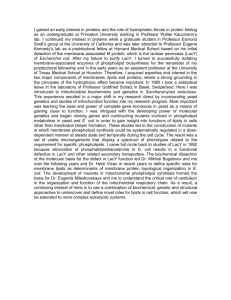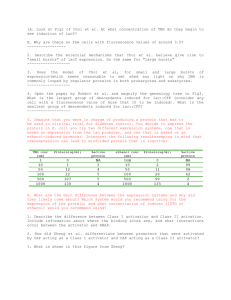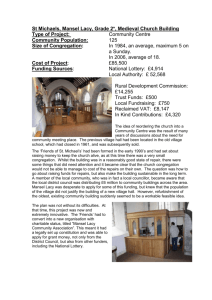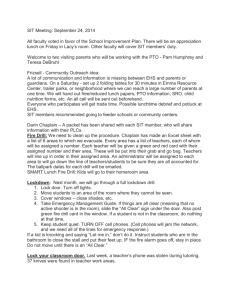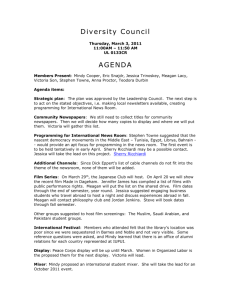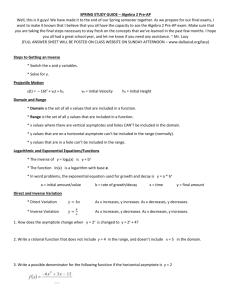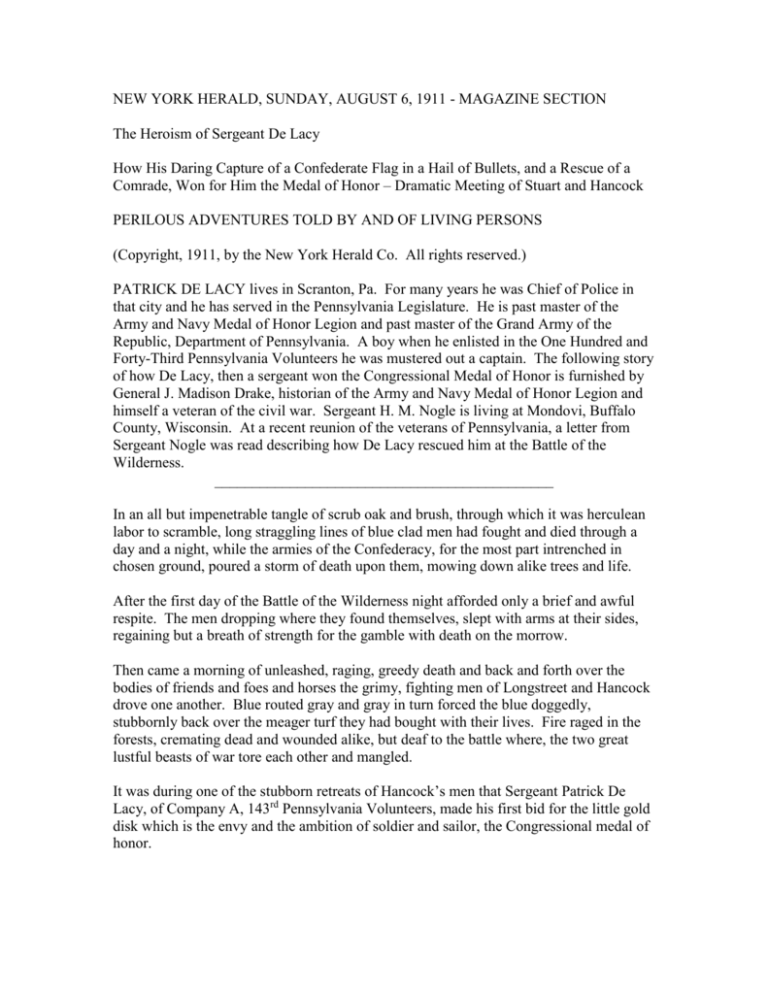
NEW YORK HERALD, SUNDAY, AUGUST 6, 1911 - MAGAZINE SECTION
The Heroism of Sergeant De Lacy
How His Daring Capture of a Confederate Flag in a Hail of Bullets, and a Rescue of a
Comrade, Won for Him the Medal of Honor – Dramatic Meeting of Stuart and Hancock
PERILOUS ADVENTURES TOLD BY AND OF LIVING PERSONS
(Copyright, 1911, by the New York Herald Co. All rights reserved.)
PATRICK DE LACY lives in Scranton, Pa. For many years he was Chief of Police in
that city and he has served in the Pennsylvania Legislature. He is past master of the
Army and Navy Medal of Honor Legion and past master of the Grand Army of the
Republic, Department of Pennsylvania. A boy when he enlisted in the One Hundred and
Forty-Third Pennsylvania Volunteers he was mustered out a captain. The following story
of how De Lacy, then a sergeant won the Congressional Medal of Honor is furnished by
General J. Madison Drake, historian of the Army and Navy Medal of Honor Legion and
himself a veteran of the civil war. Sergeant H. M. Nogle is living at Mondovi, Buffalo
County, Wisconsin. At a recent reunion of the veterans of Pennsylvania, a letter from
Sergeant Nogle was read describing how De Lacy rescued him at the Battle of the
Wilderness.
_____________________________________________
In an all but impenetrable tangle of scrub oak and brush, through which it was herculean
labor to scramble, long straggling lines of blue clad men had fought and died through a
day and a night, while the armies of the Confederacy, for the most part intrenched in
chosen ground, poured a storm of death upon them, mowing down alike trees and life.
After the first day of the Battle of the Wilderness night afforded only a brief and awful
respite. The men dropping where they found themselves, slept with arms at their sides,
regaining but a breath of strength for the gamble with death on the morrow.
Then came a morning of unleashed, raging, greedy death and back and forth over the
bodies of friends and foes and horses the grimy, fighting men of Longstreet and Hancock
drove one another. Blue routed gray and gray in turn forced the blue doggedly,
stubbornly back over the meager turf they had bought with their lives. Fire raged in the
forests, cremating dead and wounded alike, but deaf to the battle where, the two great
lustful beasts of war tore each other and mangled.
It was during one of the stubborn retreats of Hancock’s men that Sergeant Patrick De
Lacy, of Company A, 143rd Pennsylvania Volunteers, made his first bid for the little gold
disk which is the envy and the ambition of soldier and sailor, the Congressional medal of
honor.
Decimated, disorganized, broken, the brigade of which De Lacy’s regiment was a part
was being forced backward—forced at the point of the bayonet and before a rushing wall
of leaden bullets, but stubbornly fighting with the red anger of war men.
There was no time to tend the wounded. Men who could not drag themselves over the
stormy, cruel ground were left to swell the piles of dead, to be led away prisoners by the
men in gray or to be incinerated.
Rushing, trampling, always fighting, the brigade withdrew inch by inch, dwindling and
dwindling in numbers.
In the maelstrom of it all, De Lacy saw a comrade lying pinned beneath two stark, red
stained forms, a great jagged gash showing horridly where his shirt was torn away.
Almost in the very face of the enemy De Lacy paused. His very hesitancy might have
meant death. To stay to try to help was taking chances that brave men would have
shunned. But the sergeant, with lead whistling eerie melodies and death beside him and
before him and behind him, plunged over an intervening log and knelt beside the man
who coughed. “Nogle, Nogle, old chap!” he panted, “How bad are you? Can you walk?”
Sergeant Nogle could not reply. Racking, torturing, killing coughs wrenched his frame.
When De Lacy in rough haste lifted him to a sitting position he dropped back, writhing,
coughing.
De Lacy measured his chances. Through dense thickets impenetrable to the eye the
victory hungry army were advancing. Red flashes, gray-black puffs of sulphorous fumes
told that, and bullets, surging in very sheets close to the ground, swept back the Union
forces.
Then from the edge of a thicketed wood a fringe of men-demons in tattered gray
emerged. Dropping on their faces, their muskets flashing terror, they hounded with lead
the retreating men, while comrades bursting from the heavy brush swelled the line. Men
kneeling in the rear fired over their heads, and while De Lacy lingered with his friend the
Confederates formed for a fresh attack.
Panting, exhausted, with the work of battle, De Lacy could not carry the other man. In
the air, far overhead, shells were bursting and showering life taking bits of iron and scrap
over the army which was to stand the onrush of thousands.
Rescue of Nogle
De Lacy knew that when the roaring, deafening cannonade should cease the hatless,
tattered gray men forming at the forest edge would sweep over the field. With steady,
excited fingers he unknotted the fastenings, which held Nogle’s blanket in place. One tug
had it free, but with the tug the awful roar of iron monsters ceased and De Lacy knew that
the charge would come.
Frantically he worked, rolling Nogle onto the out-spread blanket, then looked up to see a
smoke swathed line of struggling, straining men bear down. Dazedly he looked about for
an instant that brought the gray men nearer. Straggling back, limping, a man who was
following the brigade in its retreat passed De Lacy.
Shouting orders to the man, who was a private, De Lacy clutched him by the shoulder
and with mingled entreaties and commands impressed him into service. Gripping the
corners of the blanket, the men staggered along under the dragging weight.
Dash after dash brought the advancing Confederates nearer, but throughout the bullet-hail
De Lacy and his helper stumbled safely with their burden.
Loose stones turned their ankles; bullets breathing hot puffs against their faces made
them duck and swerve. In their ears the yells of the war mad men behind them crashed
higher than the roar of the musketry, and through it all they heard the man in the blanket
coughing.
How long the two men with their burden staggered over the difficult ground they had no
conception. Time was not. It was a bitter, measureless struggle, and at the end death was
cheated by inches.
Reinforced, the Union lines held, and De Lacy, while the checked Confederates poured
shot and shell into the blue army, took Nogle to the rear. The man’s lung had been
punctured, but he lived, and at present lives in Mondovi, Wis.
At the first field hospital they encountered De Lacy headed for a place in an ambulance
for the wounded Nogle. Pausing but a second in his work of mercy, the surgeon looked
sharply at the man in the blanket. With gruff pity in his voice he turned away. “No use,”
he said, “We ought to keep the berths for men who have a chance. This poor fellow will
not fight to-morrow.”
That made no difference to De Lacy. He impressed into service three men, all wounded
themselves, and, providing them with a stretcher, saw Nogle toted away for the rear.
Then he was back into the fight, where the pungent smart of sulphur smoke distended his
nostrils and the fighting beast in him could rage. It was a passion of joy to De Lacy,
fighting.
Back over the same ground he stumbled, this time elbow to elbow with the blue men in
chaotic order, fighting on the same ground over which he had dragged Nogle. Back,
back, over the inches bought with blood, the gray men were driven, fighting stubbornly,
dying in their tracks.
Down a knoll, up which an hour before he had dragged in pain and anguished haste, De
Lacy lurched and scrambled and ran. Fatigue was forgotten. It was war again, real war,
man to man and an equal chance. The hot breath of the war god fanned his cheeks and
gave him life and he breathed the spirit of the battle and desired to kill.
Backing slowly, the confederates were fixing bayonets. The sun, shining red through the
low hanging curtain of powder smoke, glinted the cold, bright steel that flashed dully.
Down, down the Pennsylvania brigade swept, faster than the dying Southerners would
retreat, and then came the moment that every soldier in his cooler moments dreads.
Brass voiced bugles sounded the bayonet charge. Officers, panting and dry throated,
hawked orders and out of the mass of relentlessly advancing men a straight, thin line
swept with bright, steel blades stretching greedily before them, hungry for the wrench
against bone and muscle. Close behind another line surged and swayed, fast following on
the heels of the first. Some faster than comrades, sped ahead and took the places where
those in the advance led.
Grinning, contorted, smiling, sober faces of dead and hurt looked up at the unseeing men
sweeping over them.
In front the gallant men in dirty uniforms stood fast, braced for the crash.
Against the background of the low pitched, steady roar of the Union men the wild,
fearsome yells of the confederates ripped and echoed.
Then the clash. The two war monsters met and grappled and there was fighting with
bayonets and revolver butts and knives and lacerated ironlike knuckles. Men rolled and
fought with all the weapons man and nature had provided.
Over the battered, beaten gray the blue line surged and broke upon the second defense.
In the encounter there was everything which a man should not know or see. Sweeping
onward the Union attack trampled down the second line of defense and rushed forward.
A third line, bayonets gleaming, faced them. The men had been tried almost to the limit,
but, drawing back their guns so that all the power of their shoulders and backs would be
behind the awful knives, they rushed desperately at the third steadfast bulwark of the
confederate army.
Where man could look at man in the eyes, facing each other over mere feet of ground,
they seemed to pause. The hosts of fighting men seemed to hold their ground as if
catching one long, deep breath before the plunge. There was a sense of poise as of a ball
thrown upward just before it hurtles on its downward course. Then when the clash
should have come the Southern division surrendered. The prisoners were quickly passed
to the rear. Among them were General Edward L. Johnston and General George H.
Stuart.
General Hancock, recognizing in General Stuart a former United States cavalry officer,
offered his hand and said:-
“How are you, Stuart?”
The Southern general was proud. His eyes flashed and red mounted to his cheeks.
Drawing himself up haughtily he said:“Under the circumstances I decline to take your hand.”
It was an affront to General Hancock, and it stung the men who had dared more than life
in the charge, but the Union general, curbing his anger and subduing angry murmurs of
the men, replied:“Under any other circumstances, sir, I should not have offered it.”
While this little dramatic scene was enacted the men of the 143rd Pennsylvania were
busy. The officers had been well nigh annihilated and Sergeant De Lacy found himself
second in command of Company A. Under his direction the men replenished their
ammunition boxes, taking cartridges from the dead of both armies lying all about them.
Some, when they had taken the cartridges they were so sorely in need of, lay panting on
the ground, tongues extended, breathing hard and gathering new strength for the conflict
they knew was to come. Surging back and forward over the same ground time and again
during the day, neither army had gained any distinct advantage in territory. To the men
who could not see the whole of the fight in perspective it seemed that there would be no
end. How many of the enemy faced them they did not know. Hidden in the woods, the
confederates poured in their awful fire and the blue army replied in kind, shelling,
storming, charging.
Uniforms were torn into shreds and wounds bandaged with the ragged strips. Men bound
tight cloths about ugly gashes in arms and legs of comrades.
Staggering about like men intoxicated, many dropped from sheer exhaustion and hunger,
while others, wounded but unconscious of it in the heat of battle, suddenly crumpled
when the strain was withdrawn.
De Lacy lay flat on his back, arms extended, fairly drinking in strength and rest. The air,
hot and smoke laden as it was, felt good when he could get it in long, deep gulps. When
he had gained new strength he walked about among the men of his company, sadly few,
and cheered them. Many had seen his almost Quixotic act in saving Nogle and the feat
had its effect. Soldiers would follow him through the gates of purgatory and De Lacy,
knowing it, gloried in the knowledge.
Above the sounds of suffering, above even the wild scream of the battle itself, the frantic
gallop of a horse sounded for a moment and a capless, powder smirched aid tumbled
from a horse and the regiment received orders from General Hancock to proceed to the
crossing of the Orange plank road and the Brock road, where the Union line, literally shot
to pieces, was hard pressed and in danger of being turned.
Back across the field over which the armies had struggled the day before the
Pennsylvanians tramped at the double quick.
Men who had lain suffering through the night untended rose on their elbows and cheered.
Others begged for aid, and many, dragging themselves along the ground, were making
their way toward the rear.
About two hundred yards from the plank road, along which the One Hundred and FortyThird had been advancing, was a clump of woods and a half natural breastworks of logs.
For this position of advantage the regiment headed, but just as De Lacy, now at the head
of Company A, left the road a detachment of Longstreet’s men emerged from another
wooded section and made for the same point. The confederates were nearer the goal, but
De Lacy and his men charged.
Confederate batteries and infantry poured a storm of shot on the little band while the
Union troops attempted to beat back the charging men in gray. Man after man was left
behind the scudding blue line, but those who were unhurt rushed on. De Lacy had to
sprint to hold his position in the lead. A big corporal pressed him hard for the honor, but
the sergeant distanced him.
Longstreet’s men had decidedly the advantage. Both forces were converging and the one
to reach the barricade and woods first might reasonably expect to annihilate the other.
Battling Against Retreat.
On, on they rushed, the hot blood pounding in their temples, the fate of an army perhaps
resting on the success of their efforts. De Lacy found breath to turn and urge his men.
Pleading with them, ordering them, driving them, he ever kept the lead. Nearer and
nearer the two detachments drew. They did not stop to fire. It was a race. Speed was the
factor, which would count and the lust to kill was forgotten.
While De Lacy’s men were still in the open the first of the Confederates gained the
woods. Dropping behind trees, logs, stones, they mowed down the Pennsylvanians in
rows. Fewer and fewer grew the blue uniformed men, and as more of the confederates
gained the protection of the woods, the withering fire increased. De Lacy ordered his
men to drop to the ground.
No sooner had the Union men protected themselves as best they could than a color
sergeant mounted the confederate breastworks, and shouting to his comrades to follow
his example, waved a ribboned flag of the Confederate States before De Lacy’s men.
Volley after volley was fired point blank at him, but there he stood, hatless, his uniform
shot into shreds, but clutching the flag tightly, waving it in the very faces of the men who
had fought for days against it.
It seemed that the color sergeant bore a charmed life. At last it was more than De Lacy
could bear. Going to what thousands thought was certain death he left his own men
behind what little protection they had and dived into the maelstrom of lead, plunging
madly on toward the improvised breastworks.
As DeLacy neared his goal, the confederates began to shower more and more bullets
upon him. His clothes were almost torn from his body. Once or twice he staggered from
the impact of a bullet and well nigh fell, but he regained his footing and lurched on.
Mad cries of the companions he had left were unheeded by him. The yelling, shooting
men in the trenches before him were forgotten. Of just one thing De Lacy was conscious.
There was the confederate flag and he was going to tear it down, wrest it from the man
who flaunted it so insolently.
All the fire within range was poured down upon him, but he escaped.
Right up to the very wall of logs he sprinted, and the men in the trenches did not seem to
realize what was his purpose. Skirting along the front of the breastworks he headed for
the point where the color sergeant was waving the ragged banner. Then, as though at last
the men in gray had realized what he would do, with an ever-increasing roar they sent
bullets in hot, singing waves upon him. It seemed that they would sweep him from the
earth, blow him into nothingness, but still he did not perish.
Leaping up onto the logs he stood for a fraction of a second near his foe. The color
sergeant had a sword. Still grasping the flag he raised it. To the watching hosts it
seemed ages poised above his shoulder. De Lacy held the bent barrel of his rifle in one
hand. The stock, splintered by bullets, was drawn back ready for the thrust. In the very
moment that he stood there a ball struck the already bent barrel and nearly wrenched his
only weapon from his hands.
The Union men dared not fire. Lunging viciously at De Lacy’s head the color sergeant
put all his strength into one stroke of his sword. It was anguish to those who could see.
The Pennsylvanian thrust aside the sword in its downward crash, staggering under the
very impact of the blow. Recovering in an instant, he lunged forward, bringing the point
of the bayonet downward at the same time and pierced the Confederate through the
breast.
Even in death the southerner clutched his colors, but De Lacy wrenched them from his
lifeless hand and flaunting them for seconds on the very spot where the enemy had waved
them, he started back.
Stupefied at the daring of the man the Confederates were slow to act, and while they were
still holding their breath in suspense, De Lacy stumbled down the embankment and began
the terrible run for life.
The storm of bullets was multiplied. The firing roared and crackled, and volley after
volley rolled over each other like great waves of noise.
Darting in a zigzag course De Lacy ran and stumbled and lurched toward the Union lines.
Even after his miraculous feat none expected him to regain his men, but he passed
through that tide of fire.
Inside the lines he sank exhausted on the ground, the banner clasped close to his body.
Friendly hands lifted him and carried him to the rear where he was cared for.
General Hancock heard of the act and of the rescue of Sergeant Nogle and complimented
De Lacy in general orders. He recommended a medal of honor, and today Patrick De
Lacy, captain, wears a bit of precious metal the weight of two or three of the death
dealing leaden pellets, which were hurled at him in that awful race.

